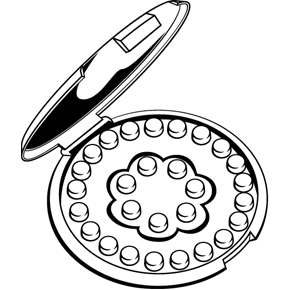Birth Control Chart
Print and Share (PDF 502KB)
| Methods | Number of pregnancies expected (per 100 Women)* | Use | Some Risks or Side Effects* This chart does not list all of the risks and side effects for each product. |
|
|---|---|---|---|---|
 |
Sterilization Surgery for Women | Less than 1 | Onetime procedure. Permanent. |
Pain Bleeding Infection or other complications after surgery |
 |
Sterilization Surgery for Men | Less than 1 | Onetime procedure. Permanent. |
Pain Bleeding Infection |
 |
IUD Copper | Less than 1 | Inserted by a healthcare provider. Lasts up to 10 years. |
Cramps Heavier, longer periods Spotting between periods |
 |
IUD with Progestin | Less than 1 | Inserted by a healthcare provider. Lasts up to 3-5 years, depending on the type. |
Irregular bleeding No periods (amenorrhea) Abdominal/pelvic pain |
 |
Implantable Rod | Less than 1 | Inserted by a healthcare provider. Lasts up to 3 years. |
Menstrual Changes Mood swings or depressed mood Weight gain Headache Acne |
 |
Shot/Injection | 6 | Need a shot every 3 months. | Loss of bone density Irregular bleeding/ Bleeding between periods Headaches Weight gain Nervousness Dizziness Abdominal discomfort |
| Oral Contraceptives “The Pill” (Combined Pill) | 9 | Must swallow a pill every day. | Spotting/ bleeding between periods Nausea Breast tenderness Headache |
|
| Oral Contraceptives “The Pill” (Extended/ Continuous Use Combined Pill) | 9 | Must swallow a pill every day. | Spotting/ bleeding between periods Nausea Breast tenderness Headache |
|
 |
Oral Contraceptives “The Mini Pill” (Progestin Only) | 9 | Must swallow a pill at the same time every day. | Spotting/ bleeding between periods Nausea Breast tenderness Headache |
 |
Patch | 9 | Put on a new patch each week for 3 weeks (21 total days). Don’t put on a patch during the fourth week. |
Spotting or bleeding between menstrual periods Nausea Stomach pain Breast tenderness Headache Skin irritation |
 |
Vaginal Contraceptive Ring | 9 | Put the ring into the vagina yourself. Keep the ring in your vagina for 3 weeks and then take it out for one week. | Vaginal discharge, discomfort in the vagina, and mild irritation. Headache Mood changes Nausea Breast tenderness |
 |
Diaphragm with Spermicide | 12 | Must use every time you have sex. | Irritation Allergic reactions Urinary tract infection |
 |
Sponge with Spermicide | 12-24 | Must use every time you have sex. | Irritation |
 |
Cervical Cap with Spermicide | 17-23 | Must use every time you have sex. | Irritation Allergic reactions Abnormal Pap test |
 |
Male Condom | 18 | Must use every time you have sex. Provides protection against some STDs. |
Irritation Allergic reactions |
 |
Female Condom | 21 | Must use every time you have sex. Provides protection against some STDs. |
Discomfort or pain during insertion or sex. Burning sensation, rash or itching |
 |
Spermicide Alone | 28 | Must use every time you have sex. | Irritation Allergic reactions Urinary tract infection |
OTHER CONTRACEPTION
Emergency Contraceptives (EC): May be used if you did not use birth control or if your regular birth control fails (such as a condom breaks). It should not be used as a regular form of birth control. Emergency contraception prevents about 55 - 85% of predicted pregnancies.
| Methods | Use | Some Risks or Side Effects* This chart does not list all of the risks and side effects for each product. |
||
|---|---|---|---|---|
 |
Levonorgestrel 1.5 mg (1 pill) Levonorgestrel 0.75 mg (2 pills) |
7 out of every 8 women who would have gotten pregnant will not become pregnant after taking this EC. | Swallow the pills as soon as possible within 3 days after having unprotected sex. | Menstrual changes Headache Nausea Dizziness Vomiting Breast pain Tiredness Lower stomach (abdominal) pain |
 |
Ulipristal Acetate | 6 or 7 out of every 10 women who would have gotten pregnant will not become pregnant after taking this EC. | Swallow the pills within 5 days after having unprotected sex. | Headache Nausea Abdominal pain Menstrual pain Tiredness Dizziness |
*For more information on the chance of getting pregnant while using a method or on the risks of a specific product, please check the product label or Trussell, J. (2011)."Contraceptive failure in the United States." Contraception 83(5):397-404.

